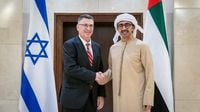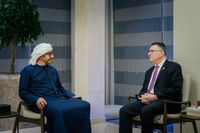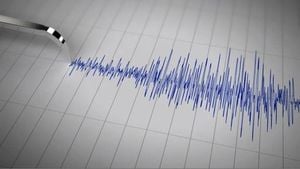The United Arab Emirates (UAE) foreign minister Sheikh Abdullah bin Zayed Al Nahyan pressed for a ceasefire in the ongoing Gaza conflict during a rare meeting with Israeli counterpart Gideon Saar on April 6, 2025, in Abu Dhabi. This encounter marks a significant moment in diplomacy, considering the limited interactions between the two nations since the outbreak of the Gaza war in October 2023, triggered by Hamas's attacks on Israel.
Established in 2020 through the US-brokered Abraham Accords, the relationship between the UAE and Israel has been strained in recent months due to the escalating violence in Gaza. The meeting was a crucial attempt to address the humanitarian crisis that has unfolded in the region, as both ministers discussed the urgent need for a ceasefire and the release of hostages.
According to an official statement from the UAE foreign ministry, Sheikh Abdullah emphasized the importance of working towards a ceasefire and highlighted the need to advance a serious political horizon to resume negotiations aimed at achieving a comprehensive peace based on the two-state solution. This approach reflects a commitment to finding a long-term resolution to the ongoing conflict.
While the UAE's statement focused on the humanitarian aspects and the need for peace, the Israeli side's readout was less specific, mentioning only "the full range of regional issues." This difference in emphasis underscores the complexities of the discussions and the differing priorities of the two countries.
Following the meeting, Saar took to the social media platform X, stating that it was his second meeting with Sheikh Abdullah. He remarked, "We discussed the full range of regional issues, as well as furthering bilateral relations between our countries. There are major challenges ahead of us in the Middle East, but there are partners for a better future of cooperation and stability." His comments reflect a cautious optimism about the potential for future collaboration between Israel and the UAE.
The backdrop of this meeting is critical, as Israel has intensified its military operations in Gaza since the collapse of a ceasefire in March 2025. The situation in the region continues to deteriorate, with reports of worsening humanitarian conditions in the Gaza Strip. As the conflict escalates, the call for a ceasefire becomes increasingly urgent.
Sheikh Abdullah's insistence on the need for a ceasefire and negotiations for peace highlights the UAE's role as a mediator and its commitment to stability in the region. The UAE has positioned itself as a key player in Middle Eastern diplomacy, balancing its relationships with both Israel and the Palestinian territories.
As the international community watches closely, the UAE's diplomatic efforts could pave the way for renewed discussions on peace in the region. The hope is that such meetings will lead to tangible outcomes that address the humanitarian crisis and foster a climate conducive to lasting peace.
In summary, the meeting between Sheikh Abdullah bin Zayed Al Nahyan and Gideon Saar is a significant step in the ongoing efforts to de-escalate tensions in Gaza. With both sides acknowledging the need for dialogue, the potential for progress remains, albeit amid a backdrop of ongoing conflict and humanitarian distress.





